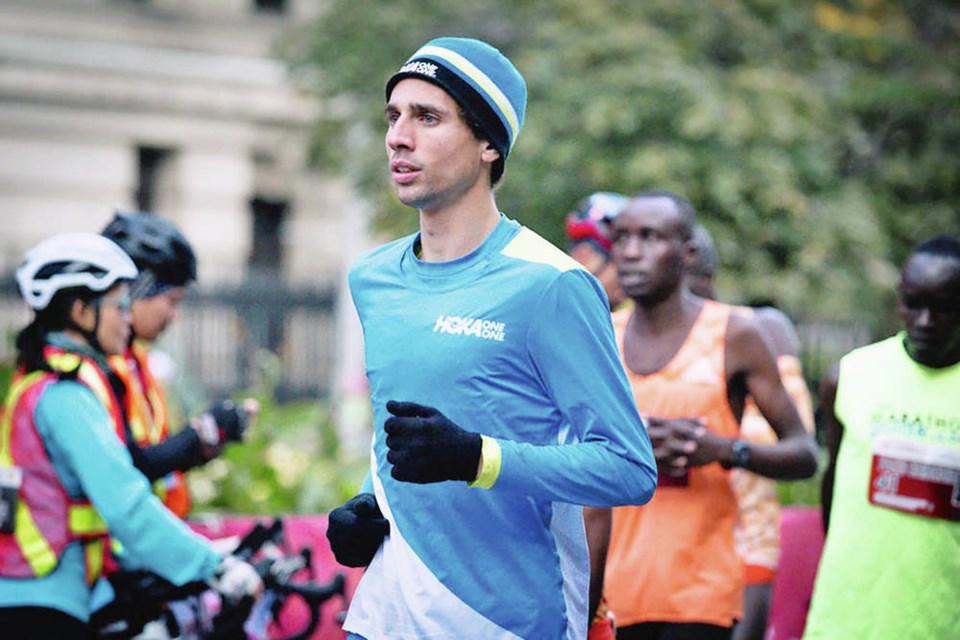It takes about 12 hours by plane, but Cam Levins of Black Creek ran to Japan in just two hours, 10 minutes and 13 seconds.
The Islander knew time was draining and quickly. But he collected himself, in his last-gasp try, and likely qualified for the Tokyo Olympic Games with the fourth-fastest time in Canadian history in winning the S7 Marathon. Yet it’s only the career second-best time for the man who holds the national record of 2:09:25, set in 2018.
Since it takes a great deal of recovery time between marathons, Sunday’s race in Austria was realistically Levins’ last chance to make the Olympic standard of 2:11:30.
The situation was complicated by the fact that all three Canadian spots for Tokyo were provisionally taken by runners who had met the standard in the qualifying period, which expires on June 3. Trevor Hofbauer of Calgary ran 2:09:51 last year, Tristan Woodfine of Cobden, Ont., recorded 2:10:15 in London in October, and Ben Preisner of Milton, Ont., ran 2:10:17 in December in Arizona.
This was Levins’ fourth marathon, and final crack at it, within the qualifying period. With the Island runner coming through in the clutch and besting both Woodfine’s and Preisner’s times, even if only by a few seconds, the Canadian men’s team for the Olympics provisionally now lines up as Hofbauer the first qualifier, Levins the second and Woodfine the third, pending results to June 3. Preisner looks to be out of luck by the slimmest of margins.
“I knew I had to do whatever it took in the time I needed to [do it] and it happened today,” Levins said in an online-posted road-side interview with a reporter immediately following the race.
“It was a wet day out there. It doesn’t really matter. You’ve got to get it done, no matter what.”
Levins broke Jerome Drayton’s hallowed 43-year-old former Canadian record of 2:10:09, set in 1975 in Fukuoka, Japan, when he ran his 2:09:25 three years ago in Toronto.
But that was outside the qualifying period for the Tokyo Olympics and the 32-year-old graduate of G.P. Vanier Secondary in Courtenay looked to be literally running out of time until lightning struck Sunday.
“I felt good out there. But it was tough all by myself,” said Levins.
“Pacers were taking me a little bit slow. So I knew I had to come back quick or at least hold it together. I felt pretty strong, but it was a tough finish still.”
The conditions were not the best, but Levins fought through them because he had no choice but to: “I’m soaked through, for sure,” he said.
Levins, based now in Portland and coached long-distance by Jim Finlayson of Victoria, appears poised to join about 75 Island-raised or -based athletes set to compete in the Tokyo Olympics and Paralympics.
The men’s Olympic marathon is scheduled for the last day of the Games, Aug. 8.
The race is scheduled for the northern Japanese city of Sapporo to avoid Tokyo’s blistering mid-summer temperatures.
Levins, whose wedding took place on Canada Day in 2013 on the grounds of St. Ann’s Academy in Victoria, began running in Grade 7 with the Comox Valley Cougars Track Club and became a high school cross-country star at G.P. Vanier.
He was an unheralded Div. 1 recruit, almost an after-thought, who rose to become the 2012 NCAA champion in the 5,000 and 10,000 metres for Southern Utah University. Levins’ former coaches and teachers in the Comox Valley gathered in the G.P. Vanier gym to watch the broadcast of him winning NCAA double gold.
Tokyo would be Levins’ second Olympics after reaching the finals in both the 5,000 and 10,000 metres at the 2012 London Games followed by winning the bronze medal in the 10,000 metres at Hampden Park in the 2014 Glasgow Commonwealth Games.
A few less successful seasons followed, beginning with surprisingly underperforming runs in the 2015 Toronto Pan Am Games. Then a tendon tear and surgery kept Levins off the track and out of the 2016 Rio Olympics.
Known for his heavy, kilometre-churning volume of training, the switch to the road and longer distances made sense and played to Levins’ strengths. That was evident in his stunning breakthrough debut marathon, in which he concluded a more than four-decade quest by Canadian runners, by eclipsing Drayton’s former national record by 44 seconds.
He completed his second most remarkable marathon over the weekend. The most memorable may yet await in Sapporo.
cdheensaw@timescolonist.com



